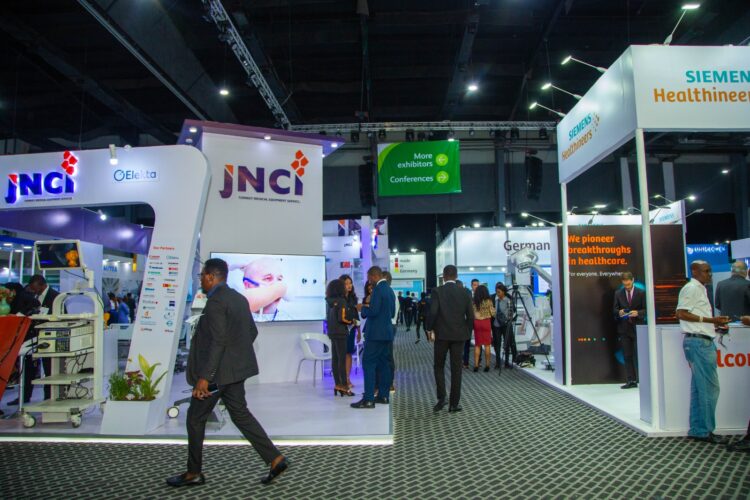The rise of mobile technology can open doors to innovative digital health solutions. The use of mobile healthcare apps will provide patients with the necessary platform to access educational resources, medication reminders, and other tools to track and manage their health conditions. They will aid in empowering patients to take a more active role in managing their health, especially those living with long-term chronic diseases such as diabetes, high blood pressure, heart disease, etc.
Other digital health solutions include wearable devices which can monitor vital signs like heart rate and blood pressure and provide real-time data to healthcare providers. Additionally, electronic health records (EHRs) allow for the secure storage and sharing of patient data thereby facilitating coordinated care and data-driven healthcare decision-making. Integrating these digital health solutions can revolutionize patient engagement, chronic disease management, and the overall efficiency of the Nigerian healthcare system.
Altogether, these emerging technologies hold immense promise for the Nigerian healthcare landscape. Telemedicine can bridge geographical gaps, bringing specialist care and education directly to underserved communities. AI will revolutionize diagnostics and treatment by boosting accuracy and efficiency. Digital health solutions will also empower patients, allowing them to actively manage their health, while also providing real-time data for better care coordination and data-driven healthcare decisions. Implementing these technologies will make healthcare in Nigeria more accessible, efficient, and empowering for both patients and providers.
However, despite the immense potential they hold, harnessing these advancements requires overcoming some challenges. These hurdles include limited access to reliable internet particularly in rural regions, lack of the requisite technological infrastructure by both the healthcare providers and the patients, and the challenge of adequately training healthcare personnel in the use of these technologies. Finally, digital health solutions raise concerns about data security and privacy. Implementing robust security measures and clear data protection regulations will be crucial to ensure patient trust and mitigate potential risks associated with these advancements.
Nevertheless, there is hope for the successful implementation of these technologies in Nigeria.
Medic West Africa 2024: Redefining Healthcare Delivery
Medic West Africa, the region’s premier healthcare exhibition and conference, provides a critical hub for the exploration of these technological advancements, the exchange of knowledge and best practices, and an avenue for necessary networking between agents across the entire value chain. Set to return for its 11th edition from April 17th – 19th 2024, Medic West Africa will convene over 6,000 healthcare professionals, fostering a platform for innovation and collaboration that propels advancements in healthcare infrastructure across West Africa.
According to a press statement, the event will host a wide range of companies across eight product categories: Medical Equipment & Devices, Disposables & Consumer Goods, Orthopaedics & Physiotherapy, Imaging & Diagnostics, Healthcare & General Services, IT Systems & solutions, Healthcare Infrastructure & Assets, and Wellness & Prevention. Its exhibition floor will be a vibrant hub showcasing the latest advancements transforming healthcare delivery.
Furthermore, the 2024 edition will also feature a comprehensive conference program designed to equip attendees with the knowledge and tools needed to navigate the ever-changing healthcare landscape. Thought leaders will present during sessions, workshops, and panel discussions, addressing key trends, challenges, and opportunities shaping the future of healthcare in Africa.
In addition, the event this year is supported by various Ministries of Health across the region including the Ministry of Health for the Republic of Ghana, Ministry of Health & Sanitation for the Government of Sierra Leone, the Ministry of Health for the Republic of Benin, and the Ministry of Health, Public Hygiene and Universal Health Coverage for the Republic of Côte d’Ivoire.
The event boasts confirmed attendance from high-level government representatives, underlining the importance Medic West Africa places on fostering collaboration across various healthcare stakeholders. They include:
- E Abdulrasaq Abdulrahman, Governor of Kwara State;
- E Josephine Chundung, Deputy Governor of Plateau State;
- Dr Salma Ibrahim Anas, Special Adviser to the President on Health;
- Amina El-Imam, Commissioner of Health, Kwara State;
- Barrister Jola Akintola, Commissioner of Health, Osun State;
- Bodiya Buma, Commissioner of Health, Taraba State;
- Habu Dahiru, Commissioner of Health, Gombe State;
- Ibrahim Dangana, Commissioner of Health, Niger State;
- Professor Baba Mallam Gana, Commissioner of Health, Borno State;
- Asabe Balarebe, Commissioner of Health, Sokoto State;
- Oluwaserinmi Adewumi Ajetunmobi, Commissioner of Health, Oyo State;
- Muhammad Kainuwa, Commissioner of Health, Jigawa State;
- Abubakar Labaran Yusuf, Commissioner of Health, Kano State; and
- Dr Felix Bilishan Tangwamia, Commissioner of Health, Adamawa State.
By actively engaging with platforms like Medic West Africa, stakeholders across the healthcare ecosystem can collaborate and pave the way for a future where technology empowers both patients and providers. The time to embrace this transformation is now, and Medic West Africa offers a valuable platform to learn, explore, and discuss the immense potential of these advancements in shaping a more accessible and efficient healthcare industry for all Nigerians.



